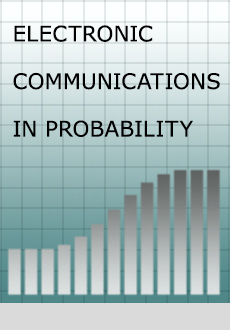Abstract
We consider a population of $N$ individuals. Each individual has a type belonging to some at most countable type space $K$. At each time step each individual of type $k\in K$ mutates to type $l\in K$ independently of the other individuals with probability $m_{k,l}$. It is shown that the associated empirical measure process is Markovian. For the two-type case $K=\{0,1\}$ we derive an explicit spectral decomposition for the transition matrix $P$ of the Markov chain $Y=(Y_n)_{n\ge 0}$, where $Y_n$ denotes the number of individuals of type $1$ at time $n$. The result in particular shows that $P$ has eigenvalues $(1-m_{0,1}-m_{1,0})^i$, $i\in \{0,\ldots ,N\}$. Applications to mean first passage times are provided.
Citation
Martin Möhle. "A spectral decomposition for a simple mutation model." Electron. Commun. Probab. 24 1 - 14, 2019. https://doi.org/10.1214/19-ECP222
Information





